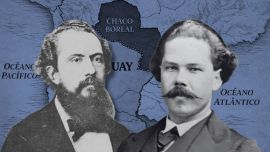Despite his strenuous efforts to come across as the embodiment of common sense, moderation, realism, tolerance, honesty, dialogue and other good things, Sergio Massa has long been regarded as a shameless opportunist, a crafty political pro who is willing to do just about anything he thinks could help him reach the goal he has set himself which, needless to say, is to get sworn in as president before too many years have gone by. His single-minded pursuit of this objective makes him a man worth watching.
It is generally assumed that he threw in his lot with the Peronist coalition put together by Cristina Fernández de Kirchner because he hoped that, next time round, she would want him to play the role she had given to Alberto Fernández after seeing that, like the current president, he had the reputation of being a relatively sane middle-of-the-road person. Now that the chances of any member of the Peronist government winning the elections scheduled for late 2023 are looking bleaker by the day, Massa is looking for an alternative route to the place he thinks should be his.
For a politician like Massa, the government is merely a vehicle he boarded because he thought it would take him towards his chosen destination. If he thinks it could break down at any moment or is liable to veer off the road in a direction he suspects would take it into a swamp from which it would be unable to extricate itself, he will step off and look for something more promising that could be going his way. Meanwhile, he is telling the two people who outrank him in the coalition that, unless they stop squabbling and get their act together, he will leave them to their own devices. By saying this sort of thing, he can claim he is doing his level best to make Cristina and Alberto see sense and cannot be blamed if they refuse to put an end to their harmful quarrel.
For his modest, but as it turned out, vital, contribution to the coalition’s electoral victory, Massa became speaker of the Lower House, a useful position for a born networker with many contacts both here and abroad, especially the United States. While going about his parliamentary duties, he proceeded to make friends with Cristina’s son Máximo Kirchner who is in charge of the La Cámpora mutual aid association which, in search of well-paid jobs for its members, has successfully colonised large chunks of Argentina’s sprawling public sector. In doing this it has made itself so unpopular that by now Massa – who once promised that if elected president he would give them all the boot – must be wondering how best to put an end to his alliance with Máximo. In any event, he knows very well that Cristina detests him as much as she does Alberto and would never trust him a single inch.
Massa evidently sees himself as the bellwether of the political flock, a far-sighted leader who can be relied upon to stride off manfully in the direction others will eventually take. For a short while, he tagged along behind Mauricio Macri, but his all too visible attempts to profit from the previous president’s setbacks put an end to that informal partnership. Then, as it became clear that if most Peronists overlooked their differences with Cristina and joined forces with her they would in all probability return to power, he decided to do just that. Now he fears that the resulting government is about to fall apart. The president and the lady who asked him to head the Peronist ticket because too many people disliked her intensely are at loggerheads; the country’s prospects being what they are, the chances of them making peace any time soon look slight.
Alberto has good reason to fear that unless the vice-president stops tripping him up his term in office will be remembered as an abject failure, but he also appears to be prepared to do his best to carry out the fairly undemanding programme that was outlined in the recent agreement with the International Monetary Fund. Cristina´s priorities are different. She desperately needs to retain enough political clout to intimidate those judges who, if so inclined, could make it their business to send her and her son Máximo to jail for purloining millions – some say billions – of dollars when she ruled the country. Though she and her supporters take it for granted that the government’s candidates will get clobbered in the elections set for next year, she apparently believes that by staunchly opposing measures that smack of austerity, beginning with those Alberto presumably has in mind, she will be able to keep her enemies in the Judiciary at bay.
No doubt Massa would prefer to see Alberto complete his allotted time in office in a decorous fashion so all those who in some way are associated with his government could pat themselves on their respective backs for keeping the show on the road. The Peronists would then be in a position to regain power should their successors fall short of expectations, as most think is more than probable, but with every day that passes that pleasing scenario looks less realistic. Instead, what Argentina seems to be heading for is a lengthy period of devastating political and economic turmoil.
The country’s problems are “structural” and are so deep-rooted that they have to do with far more than the crass incompetence of so many members of its present administration. Nonetheless, the contemptuous way Cristina and her followers, especially card-carrying activists of La Cámpora, are treating Alberto – an individual who clearly lacks the strength of character that would be needed for him to tell them where to get off and, what would be rather more impressive, for him to deprive them of the many sinecures they have collected thanks to Cristina’s ability to browbeat him into obeying her whims – is making the unhappy situation the country finds itself in much worse than would otherwise be the case.
Though Massa is a minor shareholder of the enterprise he joined in 2019, his departure could lead to its collapse. Like him, many Peronists understand it would be best for them to put as much distance as possible between themselves and a blundering government that, without enough money to keep voters happy, is crashing headlong into reality. Should Massa call it quits, they could follow him, not because they think his opinions matter but because they too have their own interests very much at heart. As veteran Peronists are fond of saying, while they will be only too happy to follow their leader to the gates of the cemetery, they will not step inside, presumably because they think someone would feel tempted to shove them into an open grave. Massa and other equally pragmatic Peronists have already reached the gates. They do not like what they see on the other side.



















Comments